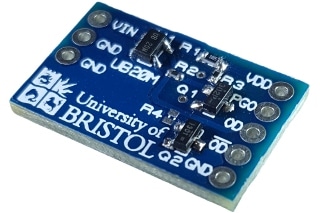Feb 9 2017
Engineers from the University of Bristol have developed a low-cost chip that allows batteries in sensors to last longer.
 The ultra-low power UB20M voltage detector chip. Image credit: University of Bristol
The ultra-low power UB20M voltage detector chip. Image credit: University of Bristol
Dr Bernard Stark and collaborators in the Bristol Electrical Energy Management Research Group based in the Merchant Venturers School of Engineering have developed a voltage detector chip that needs only a few trillionths of a watt (picowatts) to switch on other circuits. The research team is offering their chip samples to companies to use, which will allow engineers to design sensors that can continuously listen without using power from mains or a battery.
The outcome is smaller batteries, or a battery life that is expanded, in some cases by years. The voltage detector can also reduce standby power, for example, the research team has showed a TV with no continuous draw of power during standby, by utilizing a voltage detector that is prepared to operate at a distance, directly from the infrared signal of a traditional TV controller.
The patent-pending UB20M voltage detector, or keep-alive device, is a chip which, when combined with an appropriate sensor, eliminates standby power by allowing zero-power sensing and listening. It enables circuit designers to create circuits that carry out continuous monitoring without using battery power, and to use wireless wake-up with zero receiver power. Requiring no power supply, the chip, a sensor-driven circuit, uses a fraction of the power contained in the sensor’s output signal.
The ultra-low power UB20M voltage detector provides sensing that is continuous and free. This is because it is able to respond to minute quantities of power from unpowered sensors. No battery or other power is needed for the device to stay alive and listening, and battery maintenance is therefore reduced or not needed. We are now actively seeking commercial partners to use the voltage detector chip in their product, and would welcome companies to get in touch.
Dr Stark, Reader in Electrical & Electronic Engineering in the Department of Electrical & Electronic Engineering
An electronic sensing device uses power to listen and react. In sensors, such as activity monitors, security alarms, and other Internet of Things devices, the energy used to keep the device alive and listening can outweigh the energy used to react. In these situations, it is particularly important to eliminate listening power to extend battery life and create a system that is less environmentally wasteful.
In order to address this challenge, researchers have developed a method to eliminate the power drain used to listen by using tiny, insignificant amounts of energy, from the event that the device is waiting for, such as infrared light from a TV controller, or movement of an asset tracker. This energy exactly switches on battery- or mains-powered devices when required. This initiative was supported by the Government. Since the voltage detector chip is very small, it can be fitted into many autonomous electronic devices.
The voltage detector chip uses more than a thousand times less energy compared to existing detectors in order to create a turn-on signal, just five picojoules of energy and only about half a volt. Without requiring a power supply, many sensors can provide this and make listening effectively free.
There are several areas, where it would be useful to reduce the listening power to zero, including:
- Battery-driven sensors and monitoring systems, where the battery life and long-term reliability are increased, and size decreased;
- Mains-powered equipment, where savings for the environment and consumers are made;
- Remotely-powered sensors can be made smaller, by reducing battery capacity. The device also reduces the power required to remotely control these devices;
- It can also be used to produce sensing data when useful data is available, which saves processing power;
- The sensitivity of the voltage detector chip can also enable the elimination of mechanical switches.